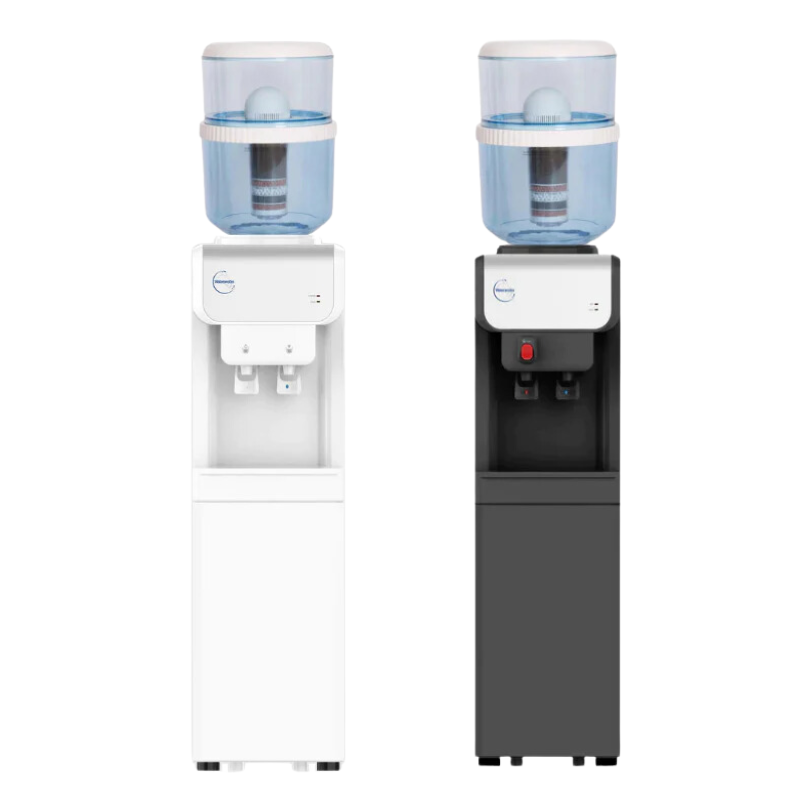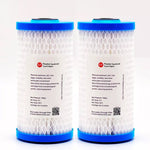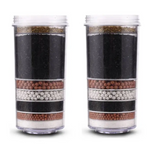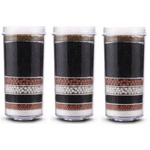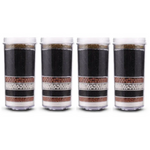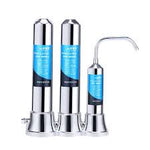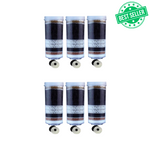You have no items in your shopping cart.
How to Filter Fluoride From Drinking Water
There are many debates on whether fluoride in water is harmful or beneficial. While there isn't yet an official response to this issue, we're here to provide you with the information you need to create your view. Here's a rundown of fluoride's effects in water, what it implies for you, and water filtering options that can help you deal with high levels.
WHY DOES OUR WATER CONTAIN FLUORIDE?
Fluoride is a chemical molecule generated from the element fluorine found in soil, water, and food. The assumption that fluoride can assist reduce the prevalence of tooth decay drives water fluoridation, which is synthetically adding fluoride to community water systems. The average fluoride concentration supplied to synthetically modified water is 1 milligram per liter, while naturally occurring fluoride amounts rarely reach 0.3 milligrams per liter.
According to the United States Department of State, The recommended fluoride level in drinking water for safeguarding tooth health is 0.7 milligrams per liter, according to the Department of Health and Human Services.
HOW CAN FLUORIDE CONSUMPTION AFFECT US?
Is it essential to add fluoride to water, even when studies demonstrate dental health benefits? Individuals who drink more water than others or newborns who drink formula prepared from tap water may be ingesting an excessive amount of fluoride because the public cannot control the proportion of fluoride added. There are alternative ways to topically introduce fluoride to dental enamel, such as brushing with fluoride-rich toothpaste, which negates the need to be added to water.
The following are some of the potential health risks of swallowing hazardous doses of fluoride:
- Skeletal fluorosis is a disorder in which bones harden and become less elastic, increasing the risk of fractures and limiting joint movement.
- Thyroid problems damage the parathyroid gland that can cause calcium depletion in bone structures, rendering them more prone to fractures.
- Based on some studies that have connected probable harmful effects on children's cognitive development, neurological issues are possible.
HOW TO FILTER FLUORIDE FROM DRINKING WATER
Water fluoridation has both advantages and disadvantages. Fluoride amounts in water vary by geography, and groundwater can have exceptionally high concentrations. But one thing we do know at Ace Water Shop is that water filtration may help remove high fluoride amounts from water.
But how can you say if your water is of good quality? You can ask experts to test your water and recommend a water filter system that is right for you. A reverse osmosis water filtration system, which employs technology to filter out pollutants like fluoride, may benefit you. Regardless matter the quality of your water, we have a solution that will satisfy your demands. We're here to keep you knowledgeable about all aspects of the water that comes out of your faucet, as well as what you can do to ensure that it's safe to drink.
BENEFITS OF DRINKING PURIFIED WATER
Drinking pure water helps to keep the body's fluid balance in check. Water makes up around 60% of your body weight. Digestion, absorption, circulation, saliva production, nutrient transfer, and body temperature regulation are all activities of various physiological fluids.
- Maintain a healthy body mass index (BMI).
- Digest food and absorb nutrients efficiently.
- Experience beautiful, healthy skin.
- Reduce inflammation in muscles and joints.
- Improve your circulation.
- Naturally detox your body.
How to Filter Fluoride From Drinking Water: WATER FILTERS THAT REMOVE FLUORIDE
As you may expect, there are numerous water filters on the market. Are they all capable of removing fluoride? Not at all.
Let's take a closer look at some of the most common types of water filters.
Reverse Osmosis
The great news is that reverse osmosis (RO) filtration systems remove 95 percent of fluoride from your drinking water. The majority of RO systems on the market are water filters that go under the sink.
Gravity Water Filters
Some excellent gravity water filters on the market remove fluoride from drinking water by eliminating 97 percent of fluoride. They're also less expensive than RO systems, although they're not as good at removing other impurities.
They're also fairly sluggish, so if you drink 5-9 liters of water per day, this would be a good option for you. Otherwise, a RO system is a way to go.
Water Filter Pitchers
You might be wondering if your Brita water pitcher or something similar removes fluoride from your drinking water. If your water filter pitcher uses activated carbon to filter out impurities, it will filter out contaminants but not fluoride.
However, double-check the parameters of your water filtration pitchers. Some of them eliminate fluoride, and they're fantastic since you can put them in the fridge to maintain the coolness on hot summer days. Also, remember to replace your pitcher filters regularly.
Water Distiller
Distillation is a popular method of purifying drinking water for many people. Although this method removes fluoride, it is time-consuming and slow, especially if you don't have any necessary equipment. You could buy a water distiller, but they only generate 2 liters of water at a time, so they're best for low-water-demand families.
FINAL THOUGHTS: How to Filter Fluoride From Drinking Water
It's safer to be safe and eliminate fluoride from your drinking water until the scientific dispute over whether fluoride is healthy for us or not comes to a satisfying conclusion. Many goods on the market will perform an excellent job at this while still being within your budget.
If you're looking for high-quality water filters in Australia, go to Ace Water Coolers and locate the best water filter for you. It's past time you took decisive action for the sake of your family's and your health.

